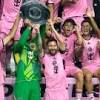Sea turtle fit with innovative 3D-printed harness for paralyzing 'bubble butt' condition

After Charlotte the green sea turtle was struck by a boat in 2008, Connecticut’s Mystic Aquarium quickly became home sweet home.
The incident caused Charlotte to have what marine biologists call Positive Buoyancy Syndrome — or “bubble butt syndrome” — a condition that traps air in the back of the turtle’s shell and tilts its rear end up at a 45-degree angle — an unnatural position for turtles to swim.
“Bubble butt syndrome” is increasing, as more sea turtles — which are already endangered — face injuries from human causes. This condition can not only cause paralysis for sea turtles, but it can make it difficult for them to feed or avoid predators, due to limited mobility.

“When turtles get hit by boats, their shells can deform slightly and that deformity causes air to get trapped in the back of their shells,” Claire Bolster, an aquarist at Mystic Aquarium, said in a video.
“Instead of sitting neutrally buoyant like turtles do, they sit with their butts up in the ocean. That can cause some pressure on their organs, it can cause some damage to their GI tracks, and, in general, that air in the track doesn’t allow them to function as a normal sea turtle.”
While some veterinarians have tried to attach weights to the shells of turtles suffering from this condition, a new effort might just make a breakthrough accessibility device the new norm for turtles like Charlotte.
Mystic Aquarium reached out to 3D printing solutions company Adia, which collaborated with experts from New Balance’s computational design team, and 3D printing group Formlabs, to create a weighted harness that would allow Charlotte to swim more easily.

“The problem we have been trying to solve is essentially putting weights on the back of Charlotte, which sounds very simple but ended up being a very challenging process,” Nick Gondek, Adia’s director of additive manufacturing, said in a video.
“The only way to really get something to stick to Charlotte was to build a custom device to help create a customized harness that would fit comfortably and snugly to Charlotte’s unique geometry.”
Solving this problem required a five-year design process, with multiple creative minds. First, 3D scanning experts created high-resolution 3D images of Charlotte to create the foundation for the rest of the design project.

Then, engineers designed multiple prototypes for the right fit, comfort, and functionality, as well as a weight system that handlers can adjust as the air bubble under Charlotte’s shell shifts and tilts.
New Balance Athletics helped by bringing in computational design experts, who, after a few iterations, created a nimble, lightweight, adjustable harness that wraps around the edge of Charlotte’s shell that can be easily removed.
Computational design refers to a method that uses pre-set algorithms and parameters to generate digital designs that can be altered to solve problems, running simulations to give feedback and refine designs.

“To help solve Charlotte’s swimming issues, digital technology has been a great help,” senior creative lead, Chris Wawrousek, said in a statement.
“Computational design really kind of comes into play where you obviously don’t really want to be designing one-for-one manually because it would take a very time-consuming process. So, being able to create a workflow that allows for a custom-generated harness is really powerful.”
After finalizing their best prototype, designers used a Formlabs Fuse Series 3D printer to fabricate the harness. They utilized a special nylon carbon-fiber material to bring the harness to life, ensuring it has the right rigidity and weight for Charlotte.
Finally, Charlotte has been able to take his harness on a test drive.
So far, things have been looking good.
“It’s looking like a very positive interaction,” Bolster said. “As we’re getting him to wear it more and be more consistent, we’ll be able to add the weights back in and just see how he tolerates it. But for now, it’s a really positive sign that he’s doing well with it right off the bat.”

As he becomes accustomed to wearing the harness and building strength in his rear flippers, Bolster and team will gradually add weights to the harness to counteract Charlotte’s “bubble butt.”
And more sea turtles could follow in his path.
“The ideal outcome of this project would be to make the technology accessible to other aquariums,” Gondek said.
In fact, Adia and New Balance are now requesting volunteers with 3D printing materials and computational science expertise to help scale this project.
“Our hope is an aquarium could upload a scan of a turtle, have access to an online design tool, which would allow them to make a few design decisions, and export a file, which would allow them to build a harness on a Fuse [printer],” Gondek said, “to, again, help better the quality of life of their turtle.”
Header image courtesy of Formlabs


 Canada
Canada Argentina
Argentina  Australia
Australia  Austria
Austria  Brazil
Brazil  Germany
Germany  Ireland
Ireland  Italy
Italy  Malaysia
Malaysia  Mexico
Mexico  New Zealand
New Zealand  Poland
Poland  South Africa
South Africa  United Kingdom
United Kingdom  United States
United States 





















